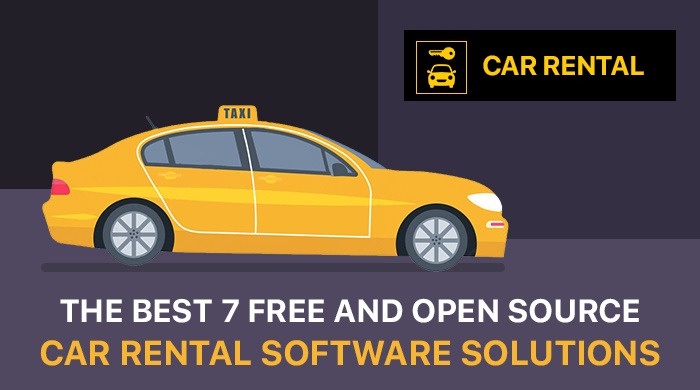Electric car manufactures are holding gains these days as the market is seeing many takers and the government is preparing for a carbon-free planet. The electric car industry has come a long way from being tagged as the rich man's preference, short-strengthened batteries to how Tesla is readying for new low-cost, long-lasting batteries putting the EVs at par with the gasoline car price. More and more car manufacturers are investing heavily to produce their line of electric cars to meet various customers' needs. It is evident that using electric cars can help many cities eliminate environmental issues like existing carbon emissions causing pollution. Legacy car makers are facing dilemmas with disruptive innovators posing to be aggressive competitors with the future gen technology. Will they grace well in this pressure? Well, the further sections of this blog will highlight the current market for both the cars with a keen focus on how the future is shaping for consumer cars.
The high acclamation of EV (Electrical Vehicles) worldwide leads the car rental industry to upgrade their fleets and replace their fuel cars with electric cars. The businesses in this sector are investing in new car rental software that includes EV fleet management features allowing them to enter the world of electromobility simultaneously, keeping the transformation costs under control.
- 6.8 million battery electric vehicles were deployed worldwide in 2020, up from 4.8 million in 2019.
- China is leading in terms of EV usage with around 4.7 million units on the road that is 42% of the global electric vehicle fleet, followed by Europe with approximately 3 million electric vehicles in use, accounting for 30% of global electric vehicles.
- 7% of Americans own an electric vehicle, and 39% of Americans stated that the next time they buy a vehicle, they are somewhat likely to go for electric rather than fueled vehicles.
Additionally, the President of the US - Joe Biden, announced that by 2030 he wants 50% of all the cars sold in the US to be electric. He has also instructed Government agencies to implement required regulatory policies to achieve this goal.
Not only in the US but in other countries as well, automobile manufacturers and consumers are moving towards electric cars. To be a part of this transition, it becomes vital to understand what is so appealing about electric cars and what might restrict consumers from using them. For that purpose, let's dive into in-depth details about electric cars and then move on to comparing them with fuel cars to get a better understanding of this subject.
What is an Electric Car?
An electric car is an automobile that works on a chargeable battery instead of gasoline (petrol and diesel). It possesses a battery and electric motor instead of a gasoline tank and internal combustion engine(ICE). The electric car utilizes a large traction battery pack that powers the electric motor and is required to be plugged into an electric vehicle supply equipment located at the charging station. The charging station can be installed in public areas and houses also. As these types of cars are powered by electricity, they are quieter while running on the road and emit no exhaust emissions.

There are different types of electric cars like -
Battery Electric Cars work totally on a battery that is charged after plugging into the electricity grid. It doesn't have a fuel tank.
Hybrid Electric Cars are low emission vehicles that utilize electric motors to assist fuel-powered engines.
Plug-in Electric Cars acquire energy from an internal combustion motor (fuel) and an electric motor (battery) and can be operated in all-electric mode or all-fuel mode depending on the situation.
Fuel Cell EVs utilize a propulsion system similar to other battery electric vehicles. This type of vehicle uses hydrogen to create electricity.. Fuel Cell EVs are more efficient as they don't emit any harmful emissions, instead they release water vapor.
Unlike a battery-electric car, the hybrid electric car and plug-in hybrid electric car use an internal combustion engine powered by petrol, diesel, or gasoline and emits carbon dioxide, which is harmful to the environment. So battery-electric cars and fuel cell cars that use electricity to run are considered better for saving costs and maintaining a clean environment.
Electric cars are still at their infancy stage and thus are facing criticisms relating to longevity, cost, performance, charging, etc. So, let's go through the answers to some frequently asked questions that can bust the myths behind electric cars.
FAQs of Electric Cars and Fuel Cars
Do Electric Cars Last Longer Than Fuel Cars?
Generally, the engine of a fuel car can last upto 12 years or about 150,000 miles and above depending on its make and model and how it is being maintained. On the other hand, electric cars' batteries last a maximum of upto 250,000 miles. Although electric cars are more fragile than fuel cars, they require less maintenance and can run more miles without major mechanical issues. Check the below image for a detailed comparison.

(Source: greencarcongress.com)
Does an Electric Car Give Less Mileage Than a Fuel Car?
A fuel car generally can run upto 150-470 miles on a full tank. In comparison, electric car models have a range of 120-300 miles on a single charge. Newer models are available in electric cars, like Tesla's electric sports car that runs 300 miles on a single charge. The electric automakers are improving their car models, making them better than fuel cars in terms of mileage.
How Difficult is it To Find Charging or Fueling Stations?
As fuel cars are in more use than electric cars, obviously, it is easier to find fueling stations than charging stations today. The concept of electric cars is still in its infancy in many countries and regions, and so the availability of charging stations is scarce. As the use of electric cars is accelerating, the number of charging stations is also increasing. In 2011, Europe had 7018 public charging stations, and in 2020 that number increased to 285,800 . The same applies to other countries as well.
Which Is More Expensive - Electric or Fuel Car?
Buying an electric car is more expensive than a fuel car. But, as the cost of electricity is less than gasoline, running and maintaining an electric vehicle is cheaper than a fuel car. However, recent developments in battery technology are helping in lowering the purchasing cost of electric cars and making them more affordable.
Which is Safer to Drive: Electric Car or Fuel Car?
Lithium batteries are less prone to the risk of fire or explosions compared to gasoline. The all-electric vehicles - Audi e-Tron, Audi e-Tron Sportback, and Tesla Model 3 have been qualified for 2021 TOP SAFETY PICK+ awards. But, electric cars are more fragile and prone to damages after crashes compared to fuel cars, as they have delicate electrical components installed within. The good news is there are new range of electric cars available now that include high-end safety features, they become safer to drive than conventionally fueled cars.
So, now moving on to the comparison between fuel and electric cars, let's quickly have a glimpse over their pros and cons and then look into the prime factors that differentiate them.
Pros and Cons of Electric Cars
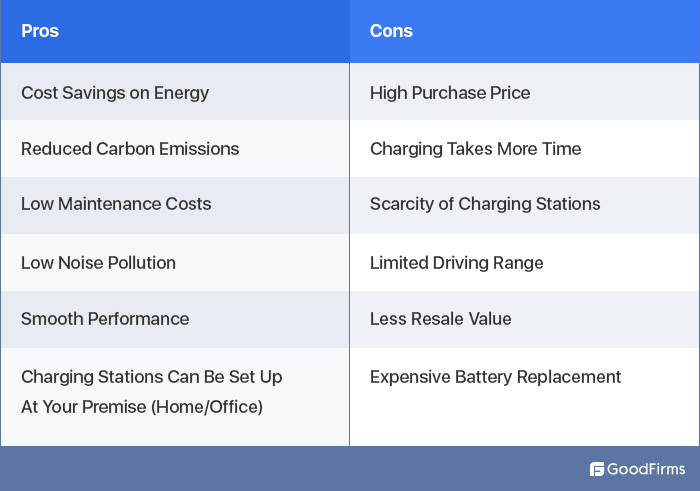
Pros and Cons of Fuel Cars
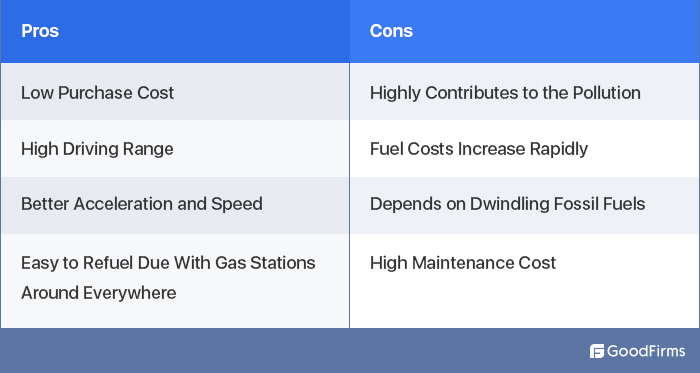
How Do Electric Cars and Fuel Cars Work?
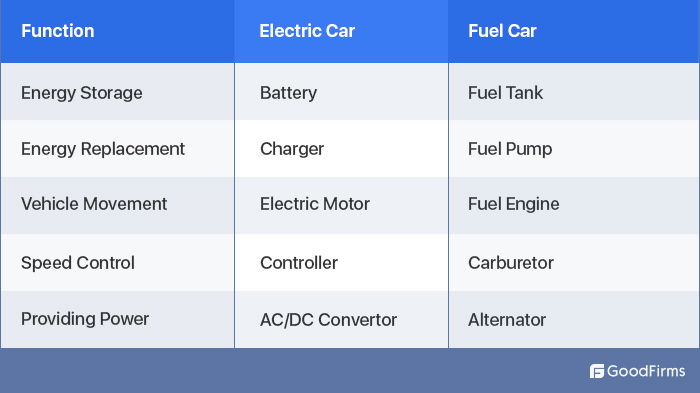
A Quick Recap of the Major Differences Between Electric Cars and Fuel Cars

Electric Car - An affordable electric car can travel between 150-200 miles between charges. Many electric cars have a higher driving range of around 250-300 miles, but those models are still expensive.
Fuel Car - Fuel cars run around 300-400 miles after refilling the tank depending on its mileage. You don’t have to pay more while purchasing the fuel car to get a higher driving range.

Electric Car - There are only around 370 electric car models available worldwide. So, the scope of vehicle selection is low when it comes to picking an electric car. Currently, there are around 10 million electric cars running on the road.
Fuel Car - Fuel cars have been here for more than a century, so there is a wide range of models available. The scope of vehicle selection is higher when it comes to picking a fueled car. There are more than 1 billion fuel vehicles running globally.

Electric Car - The purchasing cost of electric cars is higher than fuel cars. For example, the price range of the most affordable option in electric cars - 2022 Nissan Leaf is $27,400 - $37,400.
Fuel Car - The purchasing cost of fuel cars is less than the electric cars. For example, you can but a best fuel car like the 2022 Kia Rio at just $16,150.

Electric Car - The gasoline cost is higher than the eGallon (cost of fueling a vehicle with electricity) price, and so charging an electric car proves to be cheaper than refueling a fuel car. But, it takes more time to charge an electric car than refueling a fuel car.
Fuel Car - The price of gasoline is high and constantly increasing; filling up the tank of a fuel car proves to be more expensive than charging an electric vehicle. But, it takes less time to refuel a car than charging an electric car.
Just explore how much it costs to fuel an electric vehicle in your state.

Electric Car - The battery replacement price of EVs is pretty high, but still, The maintenance cost of electric cars is low compared to fuel cars, as they don't need air-filter replacements and oil changes.
Fuel Car - The cost of maintaining fuel cars is high as they have far more moving parts and require frequent air-filter replacements and oil changes compared to electric cars.

Electric Car - The number of charging stations is less in comparison to gas stations. But, that number is likely to increase with the electric cars' sales rate. Electric cars can be charged at home. Thus the scarcity of charging stations does not make an enormous impact.
Fuel Car - The number of gas stations is higher than the charging stations, making it convenient for the fueled car owners to fill up the tank whenever and wherever required.

Electric Car - In the US and many European countries, electric car owners benefit from tax credits and incentives from the government.
Fuel Car - No tax credits and incentives are given to fuel car owners worldwide.

Electric Car - No carbon emissions while using an electric car and thus is more environment-friendly.
Fuel Car - As fuel cars emit carbon dioxide from the tailpipe, they cause pollution and harm the environment.
Fuel cars, having 140 years of history, will always remain relevant and practical for many, but, at the same time, electric cars are the future of the automobile industry. There are high-end developments in the latest EVs offering many benefits in terms of fuel efficiency and minimized pollution, which cannot be ignored. To get clarification about which car model would be the best choice in the current scenario, have a look at the below details which indicate the top 5 best-selling fuel cars, plug-in hybrid cars, and electric cars with the mileage offered and their unique selling point.
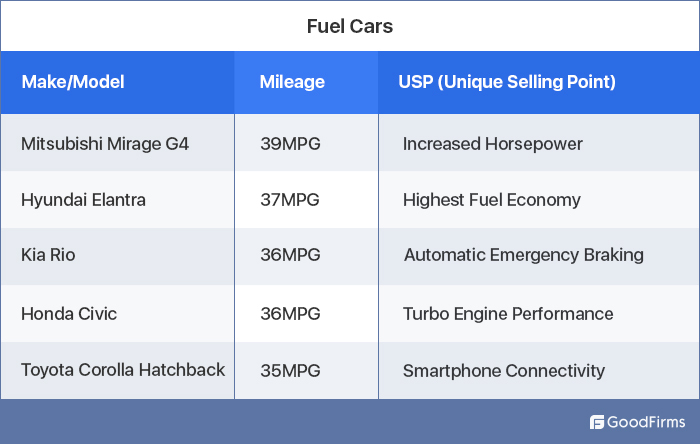
(Source: cars.com & information confirmed from official site of respective models as on 26-11-2021)
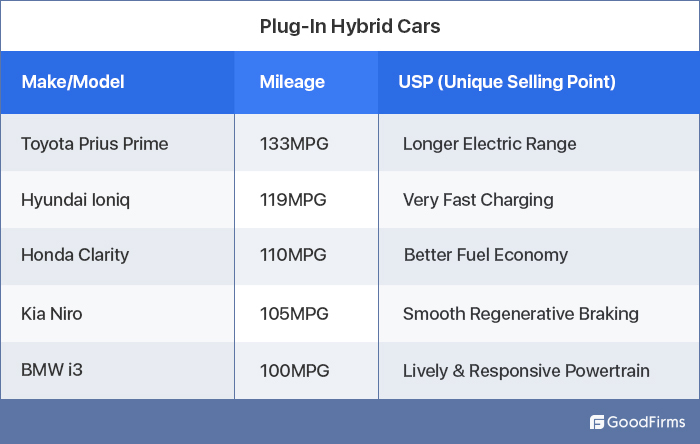
(Source: cars.com & information confirmed from official site of respective models as on 26-11-2021).
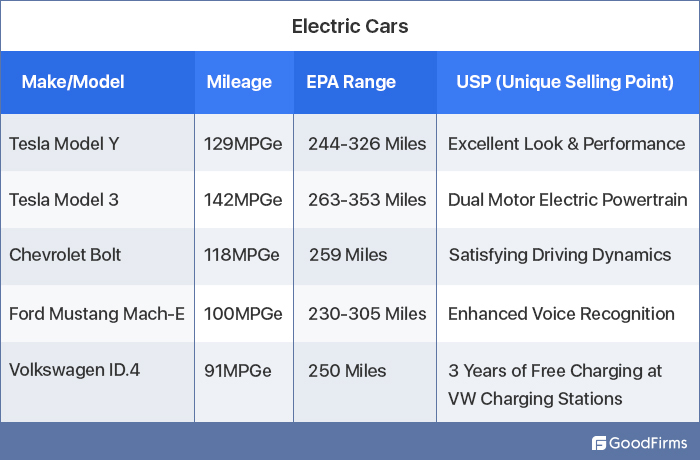
(Source: caranddriver.com & information confirmed from official site of respective models as on 26-11-2021).
The Key Takeaways
EVs are picking up pace today with many countries opting to go green. If you are managing a car rental business, possibly along with upgrading car rental technology, you can include electric cars in your fleet of vehicles. That would help you get ahead of your competitors and set new standards.
Points to consider before you invest in an Electric Car
- Commutation - If you frequently commute more than 300 miles, an electric car might not be a practical option. On the contrary, if commuting long distances is your requirement, a fuel car would be the right choice for you. Though there are many electric cars with improved battery technology available, they might be expensive.
- Charging Facilities - If you have a 120V charging outlet or a 240V charger installed in your parking space, garage, or driveway, an electric car would be a valuable possession; otherwise, it may prove to be highly inconvenient due to the scarcity of charging stations. In case of lacking charging infrastructure, fuel cars are still the right choice for you.
- Car Ownership - Do you own more than one car in your entire household? If yes, buying an electric car would help you to save costs and the environment. You can use your EV for short distances and a fueled car for long drives. If you don't own any other car, and an electric car is likely to be the only mode of transportation for you, it would be difficult to commute longer distances, considering the scenario today of lesser charging ports.
Conclusion
It is true that electric cars keep the planet green and come with low maintenance costs. Still, fuel cars are utilized more than their electric counterparts because of their lower purchasing cost and higher driving range. Contradicting this; a recent study suggests that by 2030, 18% of car sales would be battery electric vehicles (BEV). Also, it is expected that gasoline and diesel-fueled vehicle sales would decline to around 50%.
Breakdown of Global Car Sales in 2019 and 2030, by Fuel Technology
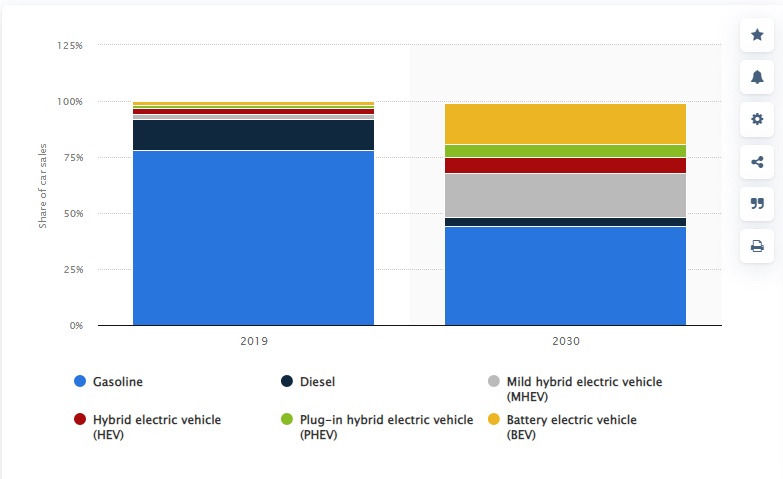
(Source: Statista)
To cope up with this forecasted growth in electric car sales; the automakers are planning to introduce new Battery Electric Vehicles (BEVs) with high-end efficiency, performance, and lower acquisition costs to retain their legacy and hold in the automobile market.
For consumers, shifting from a conventionally fueled vehicle to a modern electric vehicle can impact their cost of living, convenience, and overall lifestyle. Currently, people may be perplexed about the idea of buying electric cars due to their low driving range and lack of charging infrastructure facilities. But, the growing number of charging stations and availability of electric cars with longer driving ranges will definitely result in higher adoption rates of electric vehicles shortly and benefit the entire automotive industry. To know more about the increasing adoption of electric cars, you can through Goodfirms Survey - Electric Car Registrations See a Rise in Major Markets.







